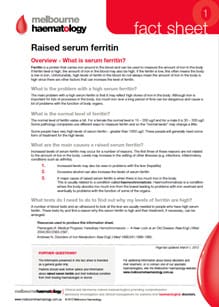Overview
Ferritin is a protein that carries iron around in the blood and can be used to measure the amount of iron in the body. If the ferritin level is high, the amount of iron in the blood may also be high. If the ferritin is low, this often means the body is low in iron. Unfortunately, high levels of ferritin in the blood do not always mean the amount of iron in the body is high since there are other factors that can increase the level of ferritin.
What is the problem with a high serum ferritin?
The main problem with a high serum ferritin is that it may reflect high stores of iron in the body.
Although iron is important for lots of processes in the body, too much iron over a long period of time can be dangerous and cause a lot of problems with the function of body organs.
What is the normal level of serum ferritin?
The normal level of ferritin varies a bit and can be dependent on age and gender.
15 ug/l
8000 neutrophils per millilitre (ml) of blood

The number of neutrophils that circulate in the blood stream varies a bit according to age however the usual range of normal neutrophil numbers is 1.5 – 8.0 X 10^9/l (1.5 million – 8 million neutrophils per litre) of blood or 1500 – 8000 neutrophils per millilitre (ml) of blood.
1500 neutrophils per millilitre (ml) of blood
8000 neutrophils per millilitre (ml) of blood
What does low neutrophils mean?
Bacterial “Fighters”
Neutrophils are particularly important in fighting bacterial infections. Bacteria is responsible for causing many different types of infections (e.g. some common ear infections, skin and wound infections) but sometimes these infections can be serious (e.g. blood infections).
Bacterial infections are treated with antibiotics unlike viral infections e.g. flu like illnesses, and the common cold which do not require treatment with antibiotics. Because your body has low neutrophils, you may be more susceptible to bacterial infections because you have fewer neutrophils to ‘fight’ the infection.
Why do I have low neutrophils?
There are a number of reasons why people have low neutrophils. Some people are born with low neutrophils, other people develop conditions that cause low neutrophils – these include immune problems, exposure to some drugs and some viral infections (such as flu like illnesses). There are a number of other rare causes of neutropenia.
Diagnosis
What tests are needed to to find out why I have neutropenia?
The types of blood tests required to determine the cause of the neutropenia will depend on how long you have had the low neutrophils. Sometimes only one or two blood tests are required; other times many blood tests and even a bone marrow test may be required.
Treatment & Management
What do I need to do about the neutropenia?
The major problem or risk factor with neutropenia is the risk of developing a (serious) bacterial infection. Sometimes it is difficult to find out if you have a bacterial infection (which needs treatment with antibiotics) or a viral infection (which does not need treatment with antibiotics).
Do I need to stay away from other people with infections?
Most infections that people pass on to each other are viral infections (e.g. the common cold). Most serious bacterial infections are not easily transferred from one person to the next. Generally you do not need to isolate yourself from other people.
How long will I have neutropenia?
This will depend on the cause of the neutropenia. Although some causes of neutropenia will not get better, most causes of neutropenia get better over a couple of months or sometimes years. Other causes of neutropenia take many years to get better.
Resources used to produce this information sheet.
- James RM. Kinsey SE. The investigation and management of chronic neutropenia in children. Archives of Disease in Childhood. 91(10):852-8, 2006 Oct
Further Questions?
The information presented in this fact sheet is intended as a general guide only.
Patients should seek further advice and information about neutropenia and their individual condition from their treating haematologist or doctor.



